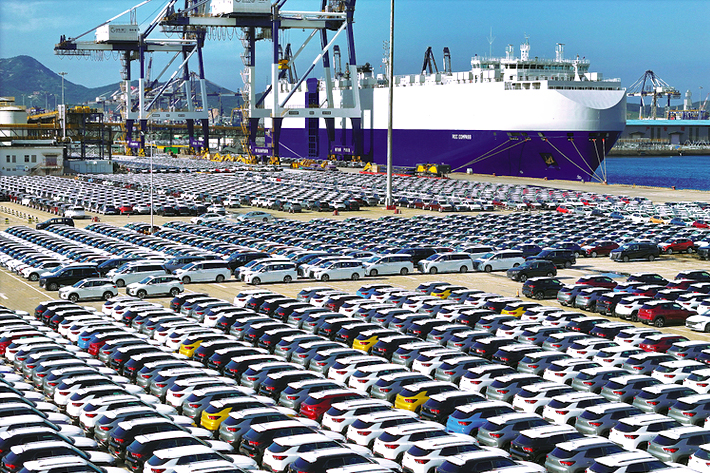The Trump Administration’s announcement of fees to be imposed on China-linked ships that dock at US ports has been condemned as ‘short-sighted.’
Shipbuilders in China say the move – aimed to help boost the country’s dying shipbuilding industry and reduce China’s grip on global shipping – is just protectionism that will be damaging to the US and inflationary.
Trump had proposed hefty fees on Chinese vessels docking at US ports, but his government watered the measures down last Thursday by shielding domestic exporters and vessel owners serving the Great Lakes, the Caribbean and US territories.
ALSO SEE: China Vows to Hit Back if Trade Deals Are Done at Its Expense
The spat over ocean shipping, which conveys 80% of global trade, is the latest conflict in an intensifying trade war between China and the US that has pushed levies on each other’s imports beyond 100%.
New fees based on weight, containers discharged
Trump had proposed fees on China-built ships of up to $1.5 million per port call, but officials opted instead to levy fees based on net tonnage or each container unloaded, as was called for by operators of small ships and transporters of heavy commodities like iron ore.
From October 14, Chinese-built and owned ships will be charged $50 a net ton, a rate that will increase by $30 a year over the next three years.
That will apply if the fee is higher than an alternative calculation method that charges $120 for each container discharged, rising to $250 after three years.
Non-US-built ships carrying cars will be charged $150 per vehicle. The fee will be applied once per voyage on affected ships and not more than five times a year.
Empty vessels that arrive at US ports to carry bulk exports like coal or grain will be exempted.
Vessels that move goods between American ports as well as from those ports to Caribbean islands and US territories are also exempted from rules, along with US and Canadian ships that stop at ports in the Great Lakes.
Chinese-built ships owned by non-Chinese firms will be charged $18 a net ton, with annual fee increases of $5 over the same period. It was not immediately clear how high the maximum fees would run for large container vessels, but the new rules give non-Chinese shipping firms a clear edge over operators such as China’s Cosco.
The notice comes on the one-year anniversary of a USTR investigation into China’s maritime activities. In January, the agency concluded that China uses unfair policies and practices to dominate global shipping.
Actions by both the Biden and Trump administrations reflect bipartisan consensus on the need to revive US shipbuilding and strengthen naval readiness.
Leaders of the United Steelworkers and the International Association of Machinists and Aerospace Workers, two of five unions that called for the investigation that led to April 17’s announcement, applauded the plan and said they were ready to work with the USTR and Congress to reinvigorate domestic shipbuilding and create high-quality jobs.
But others, such as the American Apparel & Footwear Association, weren’t so happy, saying they would reduce trade and lead to higher prices for shoppers.
Don’t blame us, Chinese shipbuilders say
The China Association of the National Shipbuilding Industry expressed “extreme indignation and resolute opposition” to the US measures, joining protests from the government and country’s shipowners.
“The decline of the US shipbuilding industry is the result of its protectionism and has nothing to do with China,” the shipbuilders said in a statement.
It warned the US restrictions would disrupt the global maritime system, lead to soaring shipping costs, further push up US inflation and harm the interest of the US people.
“We call on the international maritime industry to jointly resist this short-sighted US behaviour, and jointly maintain a fair market environment,” the industry body said, adding it expects Chinese authorities to take strong countermeasures.
Chinese ports operator Cosco Shipping said in a statement on Monday it opposed accusations by the United States and measures against China’s shipbuilding and logistics industry.
“The move is not conducive to fair competition and normal business operation order in the global shipping industry,” it said.
- Jim Pollard with Reuters
ALSO SEE:
Chinese Ships May Face a Hefty Fee to Enter US Ports
US Probe Shows China Unfairly Dominates Shipbuilding: Sources
China Says HK Ship Destroyed Baltic Gas Pipeline by Accident
China’s Cosco Shipping, Fortescue Eyeing Ammonia-Fuelled Ships
Shipping Chaos Set to be ‘New Normal’ Amid War, Climate Change
Ocean Freight Fees Shoot up After New Red Sea Ship Attacks
US Probe Shows China Unfairly Dominates Shipbuilding: Sources
China Firms Order Dozens of Ships For EV, Exports Surge
























